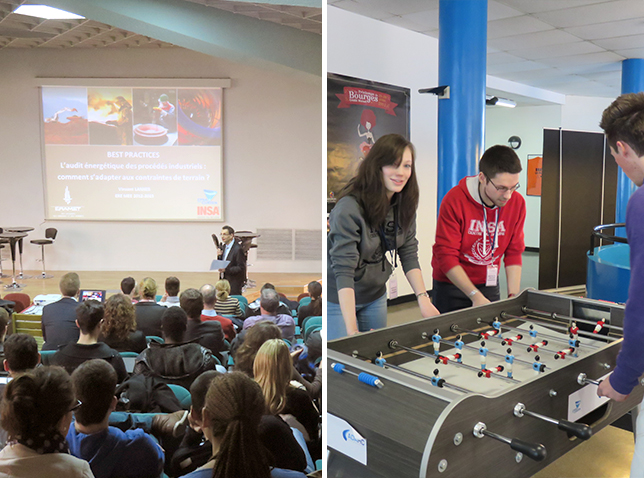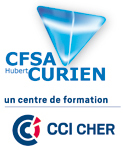Energy, risks and the environment (ERE)
Energy, Risks and the Environment Department, apprenticeship-based training delivered on the Bourges campus
Apprentice engineers must learn to deal with real-life business situations throughout their course: technical, human and financial situations. They gain from significant experience for their future career. This programme is based on a partnership between the INSA Centre Val de Loire and Hubert Curien CFSA (Apprentice Further Training Centre), which has been an expert in delivering apprenticeship-based training for over 20 years.


An apprenticeship-based engineering course
Graduates completing the Energy, Risks and the Environment (ERE) programme are awarded an engineering degree from the INSA Centre Val de Loire in partnership with the Hubert Curien CFSA of the Cher Chamber of Commerce and Industry. The programme is taught over three years via apprenticeship. It is free and apprentices receive remuneration.
3 specialities are available from the first year of the course:
- Risk Governance and Engineering (IGR)
- Quality Engineering (IQ)
- Energy Efficiency Management (MEE)
The Energy, Risks and the Environment course is work-linked, alternating between academic study periods at INSA and working periods in the host company.
The 1800 hours of academic teaching includes lectures, tutorials, classroom-based teaching and projects for example.
Apprentices must take modules covering the core syllabus for 3 specialities as well as specific modules to each speciality.
The in-company periods give apprentices the opportunity to put the academic skills acquired during their study periods at INSA into immediate practice in the workplace.
A unique work-linked training course put together for apprentices
Over the three-year course, apprentice engineers only have 7 return trips to make between the INSA Centre Val de Loire and their company and, what’s more, the periods spent in the school are always shorter than the in-company periods.
Overall, apprentices spend around 2/3 of the course in a company, working in their department at regular intervals alongside their apprenticeship supervisor. The last six months of the course are spent entirely in the company.
To be awarded their engineering degree, apprentices must develop 10 professional skills in their company – the acquisition and assimilation of which they must prove through a report and viva.
For that, they receive guidance not only from their apprenticeship supervisor but also an academic tutor at the CFSA, a risk, quality or energy efficiency professional.
International mobility: compulsory two-month study period in a foreign culture.
The core syllabus
The ERE programme teaches both a core syllabus and speciality modules. The core syllabus focuses on corporate management and sciences, thereby enabling future engineers to develop a double skill set as both an engineer and a manager.
Risk governance and engineering speciality
Risk Governance Engineers are capable of identifying hazards, assessing and controlling risks from the technical, human and organisational points of view and incorporating these approaches in the fields of corporate strategic management and security expertise.
Quality engineering speciality
Quality engineers play a key role within companies. They guarantee that the industrial processes conform to the regulatory requirements and standards in force, and must negotiate the technical and human resource improvements to be made in-house with the various departments of the company. Quality engineers do not just work in industry, but also in services and distribution. They are also involved on all matters touching on sustainable development within a company.
Energy efficiency management speciality
Energy Efficiency Management Engineers work in the sustainable building, company or local community sectors. They raise the awareness of those involved in the guidelines to be defined for an energy policy. They head up energy monitoring, optimisation and engineering missions. The course prepares engineers for supervising all of the stages relating to the construction or thermal rehabilitation of buildings, whether in terms of structure, energy system, centralised technical management or integration of techniques making use of renewable energy sources.
Examples of careers that IGR graduates have gone into:
- Dependability engineer
- SSE engineer
- Risk engineer
- HSE engineer
- Asbestos officer
Examples of careers that IQ graduates have gone into:
- Methods Quality Engineer
- QSE officer
- Manager of a materials recovery facility
- Purchasing Quality Support
Examples of careers that MEE graduates have gone into:
- Climate Engineer
- Energy Efficiency - Methods Engineer
- Climate Engineering Operations Manager
- Energy Efficiency Consultant

